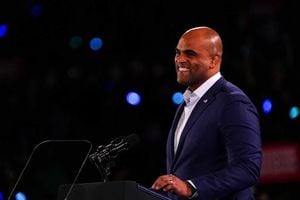In a world where social media portrays a shiny, curated version of family life, one influencer stands out not only for her idyllic lifestyle but for the sheer number of kids she raises. Hannah Neeleman, known as the "Ballerina Farm," has captured the hearts and attention of millions on platforms like Instagram and TikTok, showcasing her life as a mother of eight on a sprawling farm in Utah.
At just 34 years old, Hannah's journey began at the prestigious Juilliard School, where she trained as a ballerina. However, her life took a sharp turn when she met Daniel, her husband, who encouraged her to embark on marriage and family life before completing her studies. Now, the couple manages a 328-acre ranch, where they live with their children—Henry (12), Charles (10), George (9), Frances (7), Lois (5), Martha (3), Mabel (2), and Flora (6 months). This unconventional yet traditional family setup has sparked discussions on motherhood, modern femininity, and societal expectations.
Hannah gained significant attention earlier this year when she competed in a globally recognized beauty contest just 12 days after giving birth, making headlines for her dedication and resilience. Today, she boasts over nine million followers on Instagram, where she carefully curates glimpses of her daily life, featuring everything from milking cows to preparing home-cooked meals from scratch. Her social media presence resonates with many viewers, especially those longing for a simpler, more traditional family life in an era where such ideals often seem out of reach.
The label of a "trad wife"—a woman embracing domesticity over career ambitions—has been closely associated with Hannah. However, she insists that her reality transcends this stereotype. In interviews, she has shared, "We are traditional in the sense that it’s a man and a woman, we have children, but I do feel like we’re paving a lot of paths that haven’t been paved before." Unlike many who fit the trad wife mold, Hannah has forged a lucrative career as an influencer while juggling the demands of motherhood, claiming her own version of empowerment by shaping her family's narrative.
While Hannah embraces a lifestyle that many yearn for, it also raises critical questions about contemporary family values. Some critics argue that promoting the trad wife lifestyle perpetuates regressive gender roles, potentially setting back the progress made towards women’s rights and freedoms. Others point out that her suburban fantasy, heavily supported by the generational wealth of her husband’s family—Daniel’s father, David Neeleman, founded JetBlue Airways—could be unrealistic for the majority.
In recent years, the growth of social media has given rise to a significant cohort of influencers, like Hannah, who embrace large families while simultaneously building sustainable online businesses. This trend can be traced back to a broader cultural fascination with big families, where platforms like TikTok or Instagram serve as both a stage and a marketplace. Videos showcasing daily life with multiple children—whether it's preparing meals for a dozen or managing chaotic morning routines—have gone viral, sometimes accumulating billions of views.
Various perspectives arise from this phenomenon. Some individuals view these spacious family representations as dreamy or aspirational, providing a counter-narrative to the common narrative of smaller families struggling under economic pressures. American birth rates have been on a decline, with current averages hovering at around 1.6 children per woman, thus raising the question: why are we enthralled with the notion of larger families now more than ever?
This contradiction is evident as influencers like Hannah offer a performative glimpse into a life that might appear carefree and fulfilling yet is grounded in significant economic support. Critics argue that while Hannah's lifestyle seems radiant, it lacks the darker realities that accompany large families for many households today. Rising surgery and tuition costs, coupled with stagnant wages, leave families feeling overwhelmed and financially insecure.
Lifestyle influencers often present a selected aspect of motherhood that peeks through a polished lens—a scenic farm, bountiful harvests, and cooperative children. Yet, beneath this appealing surface lies an intricate tapestry of daily challenges and sacrifices. Hannah often acknowledges that her days are physically demanding; she routinely experiences utter exhaustion, pushing the limits of her energy and sanity as she balances between being a nurturing mother and a dedicated businesswoman.
On social media, she presents an almost idyllic vision of her life. Sewing in the afternoons, preparing homemade meals, and managing children may seem straightforward online. But Hannah has spoken candidly about how rigorous parenting can be, revealing her struggles with feelings of being burnt out. Despite the sacrifices made for her family, she remains committed to her lifestyle, saying, "I don't even know if I would call myself a feminist now," as she resonates with the complexities of gender roles existing in 21st-century America.
Hannah's decision to opt against pain relief during childbirth—a choice she has made for six out of her eight deliveries—stems from deeply held personal beliefs influenced by her faith as a devoted member of the Church of Jesus Christ of Latter-day Saints. For her, motherhood is intricately tied to spirituality, which informs her choices and lifestyle. The family's religious beliefs play a foundational role in how they engage with their communities and approach parenting.
In an era reflecting tumbling birth rates and evolving definitions of motherhood, Hannah’s narrative exposes the complex realities of contemporary parenting. Her sizable online presence sparks dialogue among women, inspiring some while frustrating others. Through her platform, she confronts the balance between presenting an empowering image of motherhood and addressing the pressures and sacrifices that large families entail.
As societal narratives around family and femininity morph, it begs the question: what does it mean to be a mother today? Can one navigate a balance between embracing domesticity and asserting independence in a world filled with diverse opinions on gender and labor? For Hannah and other influencers like her, the quest for authenticity and representation remains paramount as they grapple with the ongoing evolution of family life in today's society.
Conclusively, within Hannah Neeleman's narrative lies a broader societal commentary—a tension between aspirational depictions and financial realism, illuminating the ways in which personal stories can strike chords, expand dialogues, and possibly reshape the norms that govern our understanding of motherhood and family.



